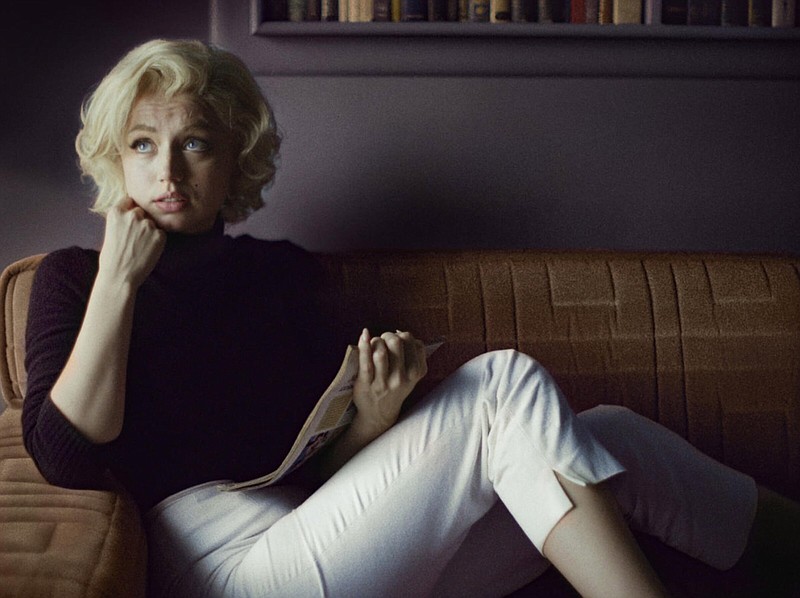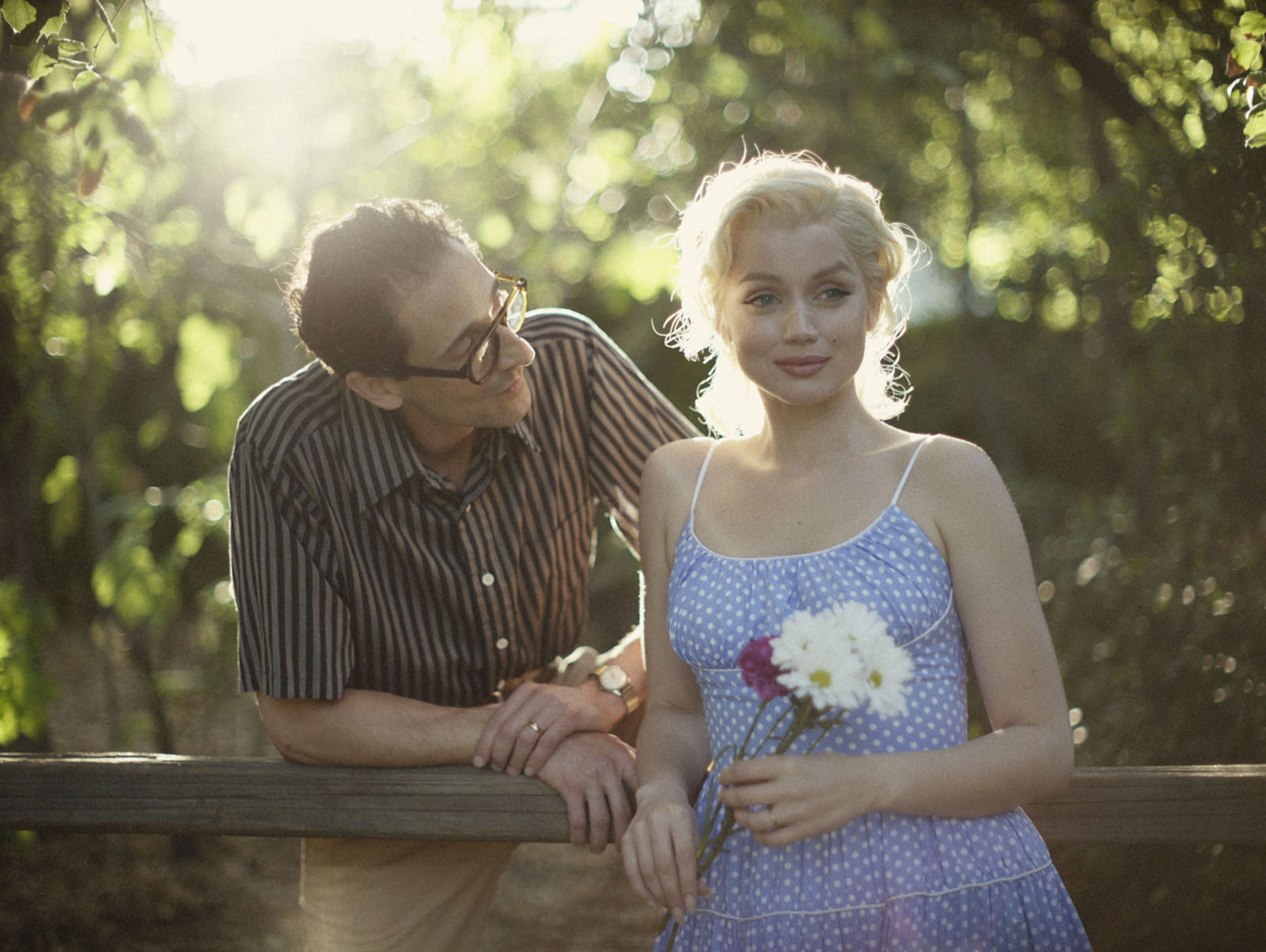Earlier this year, "Cow," Andrea Arnold's heart-rendering documentary about a sweet-faced bovine, living her life at a (reasonably) compassionate dairy farm in England, was released to significant acclaim. Though animal lovers might have viewed it as a film about the continued exploitation of farm animals for human profit, Arnold herself tried to keep her own feelings on the subject out of the text, as it were.
She wanted to make a film that was balanced (hence, her choice of a small, non-conglomerated farm, where the workers actually seemed to take care of the animals), not a direct political statement. When it was released, she said she wanted to represent the life of such a creature, and the price that they pay in service to human demands.
I kept coming back to that idea, the behind-the-scenes suffering of living things in order to provide what people want, while watching Andrew Dominik's take-no-prisoners film "Blonde," based on the novel by Joyce Carol Oates, about the life of Marilyn Monroe (played by Ana de Armas), one of Hollywood's most famously enduring movie stars, and the heavy price she paid to give studios, executives, husbands, and movie audiences what it is they wanted.
To be clear, the film, as with the book, is a fictional account of the miserable experience of Monroe -- albeit, in broad strokes, based on the historic record. There are any number of assumptions, conflations, and fictional notions involved (which, honestly, keeps it about on par with most straight-up bio-pics, in this regard), though the central thrust of the film -- Marilyn's continued abuse and exploitation at the hands of people who should have been looking out for her, remains pretty solid, both for her as an individual, and as the very nature of the industry itself, which continues to chew up gorgeous young stars and reduce them to so much gristle in the cause of profits and bankability. Especially before the #metoo movement, which at least put studio executives and Hollywood power mongers on notice that such reprehensible behavior could come back on them, the status quo was a dreary exploitation machine.
DOMINIK'S WORK
Dominik, director of the stunning "The Assassination of Jesse James by the Coward Robert Ford" back in 2007, has always been an inventive visual stylist. Along with his extremely talented cinematographer, Chayse Irvin, and a fantastic crew of art and costume designers, he has created a reverent, emotionally vibrant palette from which to paint his damning portrait. It does follow a kind of chronology -- we begin with Norma Jeane as a young child (played here by Lily Fisher) living with her severely disturbed mother in 1933, and work our way up through her early days in Hollywood, all the way to her drug-overdose death in 1962 -- but it's no greatest hits package (and those elements that are referenced, including the infamous song and dance number from "Gentlemen Prefer Blondes," and the even more iconic wind-upskirt scene from "The Seven Year Itch," are put in vastly bleaker context).
Instead, Dominik, who also wrote the screenplay, takes a more exegetic approach. In this version of events, there is a distinct split from superstar "Marilyn" and, regular, old Norma Jeane (a distinction she herself makes abundantly clear in one scene near the end, as she tries to conjure Marilyn up for a public appearance, exhorting her alter-ego to appear, as Bruce Banner might do with the Hulk), and a friction between the two personas that Norma Jeane, quiet, demure, desperately wanting to be loved, notes with some degree of weary hatred.
MAJOR EVENTS
In her earlier days as a starlet, Norma Jeane befriends a couple of derelict scions from Hollywood royalty -- Eddy Robinson (Evan Williams), son of Edward G., and Cass Chaplin (Xavier Samuel), son of Charlie -- forming a sort of throuple, until her first pregnancy comes into play, leading her to an unwanted abortion (graphically rendered, it must be noted), and a forced stepping away from her friends, who, despite their drunken ruination, seemed to actually care about her.
In their place come a pair of ill-fated marriages, first to Joe DiMagio (Bobby Cannavale), labeled simply "The Ex-Athlete" in the credits, a mean-spirited, jealous-minded man who beats on her for being loved by the rest of the world; and then to "The Playwright" (Adrien Brody) -- Arthur Miller, in other words -- whose sweet neediness turns Norma Jeane cold and distant. To keep things absolutely on the nose, Dominik has Norma Jeane refer to both men as "daddy" for a pet name, a signifier of yearning that Norma Jeane, who never met her actual father, but hoped, as always, he was somewhere out there, watching over her.
MONROE AND 'THE PRESIDENT'
Neither encounter is quite as disturbing and dehumanizing as her experience with "The President" (Caspar Phillipson) -- J.F.K. -- who flies her across the country to New York, when she's so drug-addled she can barely stand up, and has her service him in a hotel room, surrounded by secret service agents, as he continues a phone conversation with an unseen dignitary, before packing her up and sending her home again immediately afterward.
As things get more chaotic in her life, in a vicious riptide of celebrity that mostly occurs off-screen -- Dominik remains so uninterested in charting her rise to stardom, her career is treated almost as subtext, something that happens in the deep background of Norma Jeane's malaise, the "Marilyn" persona nearly an afterthought to the vessel that contains her -- Dominik's frame gets more distorted with soft-focus elements, edit snares, and tracking shots that follow into oblivion. Her drug-haze, initially administered by on-set "doctors," who fill up her veins with codeine in order for her to perform, begins to permeate her waking life, such that the lines are almost completely blurred.
CRITICISM
From a marketing standpoint, it's pretty clear Netflix is going to have a difficult sell: The name recognition is such that a lot of people will watch it assuming it to be a bio-pic of the life of a movie star, and will be -- shall we say -- horrified to find it's a scathing, visceral dirge, a tone poem about consumption and personal cost that never eases up from its bleakness. It's also true that Dominik scrupulously avoids any elements of Marilyn's life that might conflict with this portrayal -- her own mettle, much stronger than the film would suggest, led her to start her own production company in 1955, after all -- but it's clear that the portrayal is less Marilyn, than "Marilyn," a means to a thematic end.
There has already been serious blowback from many of the critics who viewed it, it's not hard to imagine Dominik's uncompromisingly desolate vision being eviscerated by the general public. But that's not to say its message isn't accurate. As "Cow" was met with resistance from a public that doesn't want to have to consider the cost of its own pleasure, I expect this film will be met with even greater fury. The truth often hurts.
‘Blonde’
85 Cast: Ana de Armas, Adrien Brody, Bobby Cannavale, Xavier Samuel, Julianne Nicholson, Garret Dillahunt, Scoot McNairy
Director: Andrew Dominik
Rating: NC-17
Running time: 2 hours, 46 minutes
Streaming on Netflix

